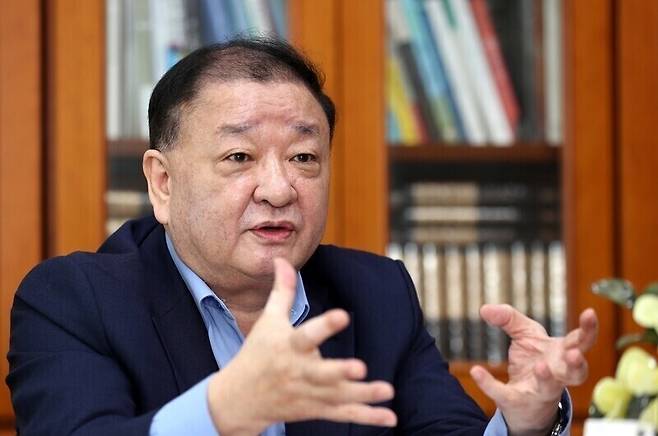S. Korea's new ambassador to Japan advocates finding "political solution" to historical conflicts
이 글자크기로 변경됩니다.
(예시) 가장 빠른 뉴스가 있고 다양한 정보, 쌍방향 소통이 숨쉬는 다음뉴스를 만나보세요. 다음뉴스는 국내외 주요이슈와 실시간 속보, 문화생활 및 다양한 분야의 뉴스를 입체적으로 전달하고 있습니다.

Kang Chang-il, South Korea’s new ambassador to Japan, emphasized that the two countries “need to seek a political solution” to historical conflicts, including the conscription of Koreans for forced labor during the Japanese colonial period, if they are to resolve their relations, which have reached “the lowest point since the establishment of diplomatic relations.”
While Korean politicians have openly spoken of the need for a “political solution,” this is the first time the South Korean government has officially expressed its intention to politically resolve the issue of compensation for forced labor victims.
Kang also said the South Korean government “must not repeat past errors” as it reckons with a South Korean court that ruled on Jan. 18 that the Japanese government must pay damages to the former comfort women who sued it.
“This is the lowest situation since [South Korea and Japan’s] establishment of diplomatic relations in 1965. [Unlike the past,] the battlelines have expanded from historical conflict to the areas of the economy and security,” Kang said during a video press conference with reporters on Jan. 17, as he prepares to assume his position on Jan. 22.
“We’ve learned the lesson that it doesn’t help either South Korea or Japan when historical issues get entangled with economic ones,” he said.
In terms of a solution to the forced labor issue, Kang said, “There are a lot of ways for [South Korea and Japan] to resolve that while honoring each other’s principles and justifications.”
“There are 12 ideas that experts have discussed,” he noted.
Kang also said that when President Moon Jae-in was awarding him his credentials on Jan. 14, he told the president that he would “be willing to play any role necessary for the successful holding of the Tokyo Olympics” and wanted to “meet and speak frankly with Prime Minister Yoshihide Suga.”
Suga refused meeting with parting S. Korean ambassador
But while South Korea has emphasized a “political solution,” the mood in Japan has been frosty. Suga reportedly declined to have a farewell meeting with South Korean Ambassador to Japan Nam Kwan-pyo before Nam’s return to South Korea. This stood in contrast with Moon, who met on Jan. 14 with departing Japanese Ambassador to South Korea Koji Tomita and talked about “swiftly restoring South Korea-Japan relations” ahead of Tomita’s new assignment as Japanese Ambassador to the US. Responding to comments that Suga’s failure to meet with Nam was a breach of diplomatic protocol, Kang said, “I sort of feel that way too.”
“I’m not sure why he couldn’t say goodbye or meet with [Nam],” he added.
By Kim Ji-eun and Kim So-youn, staff reporters
Please direct comments or questions to [english@hani.co.kr]
Copyright © 한겨레신문사 All Rights Reserved. 무단 전재, 재배포, AI 학습 및 활용 금지
- [포토] “커피 한잔” 부탁한 노숙인에게 점퍼·장갑까지 건넨 시민
- 카공족이 돌아왔다…손님·업주 “이제 숨통이 트일 것 같다”
- 전주 콩나물국밥, 세계 9대 숙취해소 음식 선정
- ‘해피캠퍼스’ 자료 짜깁기 해 특허청장상까지…부실 공모전 ‘도마’
- “밍크고래 죽인 그물, 북극곰도 인간도 죽일 수 있다”
- ‘마약 밀반입’ CJ 이재현 장남 이선호, 슬그머니 회사 복귀
- 이재용 구속된 날 삼성전자 3.4%↓…그룹주도 일제히 약세
- ‘입양아 교체’라니…논란 부른 문 대통령 ‘아동학대 해법’
- 얼룩말 무늬, 포식자 헷갈릴까? 실험해 봤더니
- 코로나 착한 임대료 이어진다…조선대, 학내 임대료 감면